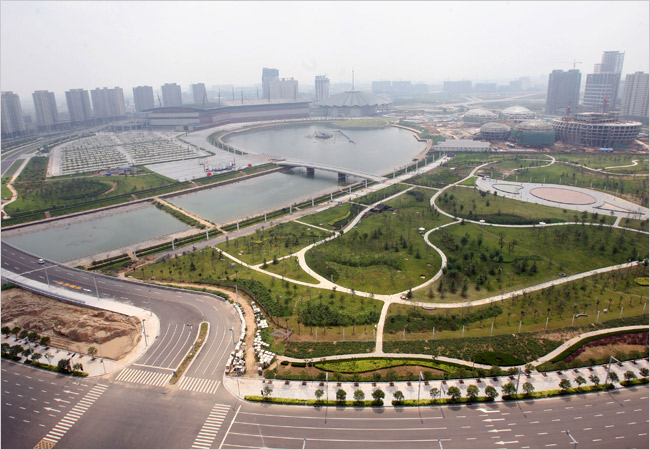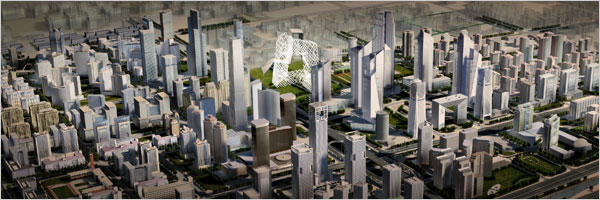Adventures in architectural development
 [Image: Ripping up British railroad tracks in Angola under Chinese supervision; New York Times].
[Image: Ripping up British railroad tracks in Angola under Chinese supervision; New York Times].An excellent – if gigantic – article about international development, foreign aid, construction contracts, and "China's African adventure" was published last weekend in the New York Times.
There, we find China reconsidered as a kind of economic event with infrastructural effects in distant landscapes. In Africa, for instance, "China has already begun, in myriad ways, to serve the interests of [developing nations], while the United States, preoccupied with terrorism, has seen its dominant status slip. Angola, once a cold-war pawn, can now serve as a kind of test case in the latest struggle to shape Africa’s destiny. Call it Chinese-style globalization."
The article is quick to point out that China already has "a long history as a development partner; Africa is dotted with gigantic sports complexes and People’s Halls built by Chinese engineers at the behest of dictators." It will now be dotted with Chinese-built roads, railways, and conference centers.
Quoting at length:
- Four or five miles along the asphalt road that runs east from Kaala, a small town in central Angola, a Chinese construction company has carved an unexpected right turn, a broad dirt path that runs over a rise through scrubby forest. The path, which has no marking, winds past a basketball court – recreation for the work force – and then empties out into a vast plaza of meticulously smoothed earth. Dump trucks ferry loads of dirt back and forth. At the far end of the plaza, obscured by tree trunks that have been uprooted and laid carefully on their sides, are train tracks. The whole scene, invisible from the road, conjures the stupendous designs of the evil genius in a Bond film.
The weed-covered tracks are the remnants of a railway built by British engineers a century ago to transport precious minerals from the heart of the continent to the port of Lobito, more than a thousand miles away. The Angolan government is paying a consortium of Chinese companies $1.9 billion to completely reconstruct the tracks, the bridges, the stations, the equipment, all shattered by a quarter-century of warfare and neglect.
It seems totally legitimate to wonder, then, what future literatures might emerge in such a setting. Will Chinese middle managers with a taste for spy novels write, under pseudonyms, the first great Graham Greenian thrillers of the 21st century? Mineral rights, emerging diseases, oil fields, ethnic tension, and weekend flights back home to Beijing... What future plots will take shape during the final years of "China's African adventure"? Will a Chinese Archigram publish its own delirious manifestos for instant development, modular villages built with oil money on the shores of manmade lakes?
In any case, the New York Times continues: "The Chinese are a mysterious presence in Angola. Everyone seems to know about them and their assorted projects, but few people have actually seen them, and scarcely anyone can claim to have talked to them. The Chinese rarely venture beyond the encampments in which they live and work."
Meanwhile, if your curiosity about China has been piqued, don't miss another gigantic article from the New York Times about that nation's industrially over-exploited Yellow River.
 [Image: The city of Zhengzhou, on the banks of the Yellow River; New York Times].
[Image: The city of Zhengzhou, on the banks of the Yellow River; New York Times]."The Yellow River, curving through regions only intermittently touched by the country’s boom, offers a tour of the pressures and contradictions bearing down on China, and of the government’s efforts to address them," we read.
- Most astonishing, cities beside the river like Yinchuan, Luoyang and Zhengzhou – places few Americans have ever heard of – are racing to become China’s next new regional urban center with almost hallucinatory building booms. Yinchuan, a modest, ancient capital, is building an entire city district for a vast government complex and is adding 20 million square feet of construction every year through 2011. Luoyang, once the capital of the Zhou dynasty, has built a cluster of futuristic sports stadiums that look like a grounded armada of metallic, alien spaceships.
 That building, we read, will be "one of the largest ever constructed," and it will loom "like some kind of science-fiction creature poised to stomp all over the surrounding central business district." It's due for completion by the end of 2007.
That building, we read, will be "one of the largest ever constructed," and it will loom "like some kind of science-fiction creature poised to stomp all over the surrounding central business district." It's due for completion by the end of 2007. Read a bit more about the project at BusinessWeek – or in Koolhaas's own, and ultimately somewhat content-less, Content.






Comments are moderated.
If it's not spam, it will appear here shortly!
Hi Geoff,
Amazing post as always, but, and this is pretty off topic, but just wanted to ask if you had read Bruce Wagner's 'Memorial', or, for that matter, Cormac McCarthy's 'The Road'?
Would be nice to have a yearly 'best architectural fiction' post, and those are definitly my two nominees, memorial being wonderful and occasionally hilarious in terms of the life of architechts, and The road including some of the most chilling and believable post-apoctalyptic ruin imagery since, of course, Ballard.
How great would an actual award ceremony be? "The J.G. Ballard award for speculative or reflective architecture in fiction."
Now who could we ask to design the trophy...
Perhaps one day Africans will fly into Holland, Idaho, and Shanghai to supervise construction and oversee their investments.
Hey lapsarian - great idea; what else do you nominate? The Road is on my Christmas list, so I haven't read it yet; and I haven't read Memorial, either. I'll check it out. For a variety of reasons I just read Max Brooks' World War Z, about zombies, and it's got one or two architecturally interesting moments - but the other books I'd cite or nominate for such an award came out last year. Ballard's got a new novel, of course, though it's only published in GB.
But it's a great idea; send in more nominations, and maybe we can actually make it happen. A year-end award for architecturally speculative fiction...
New Nomination:
And i'm not done this yet, but I've spent the last too many hours buried in the new Pynchon novel (finally!) and there are some stunning arcitectural imaginings in there already (including a phenomenal description of the Chicago World's Fair), pretty much rounding off what has been a great year for fiction in general.
Outside of merely this years fiction, I'm curious about other favourites of yours, I vaguely recall you mentioning Ambergris right?
I haven't read the Pynchon yet. Not sure it's on my list - but I'll give it a scan if you recommend? Rupert Thomson's Divided Kingdom, though it came out in 2005 in the US, has some great stuff, too; I've been meaning to excerpt parts of it on the blog for a long, long time. It gives us the UK split up into four principalities, etc. etc.
And, speaking of Ambergris: Science Fiction and the City: BLDGBLOG interviews Jeff VanderMeer. Check it out.
Enjoy scanning those 1085 pages!
(We know !)
That exclamation mark should read: "how you feel about overlong books!" Some mysterious workings of the html.
Post a Comment